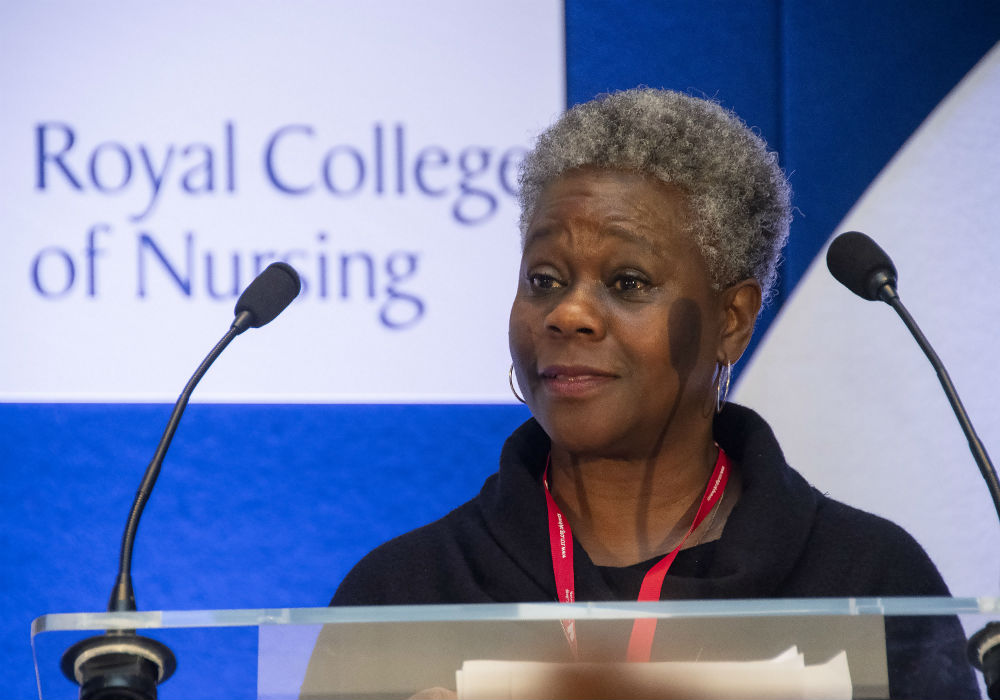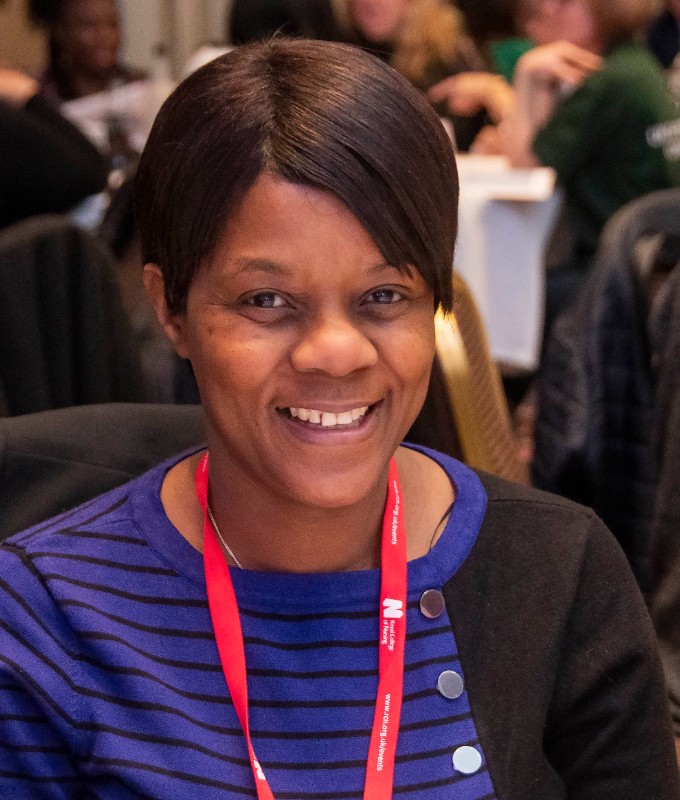A packed agenda at the RCN joint reps conference in Leeds saw member engagement in the spotlight with reps asked to suggest solutions for getting members fired up about current campaigns.
Safe staffing proved a hot topic, with progress on the campaign for legislation in all parts of the UK dominating discussions at the two-day event.
RCN President Anne Marie Rafferty kicked off day one describing the energy in the room as “fizzing” and demonstrating her enthusiasm for helping drive the campaign over the next two years.

“I believe this is a totemic moment in the history of the RCN,” she said. “The work we do now, not only to shape safe staffing in each of the four UK countries, but by driving member engagement, will have an impact on our colleagues and their patients for the next 100 years.
“It’s becoming clearer to me just how important you, as reps, are and will be to every part of our campaign. For you are the boots on the ground, the eyes and ears of the RCN, so vital to gathering and sharing data and experience, mobilising your power to unlock the change that our members want to see.”
How can reps influence the safe staffing campaign?
Anne Marie gave examples of how each type of RCN rep can influence the campaign.
As a steward…
When a member contacts you, needing support because they have made an error, you can ask what was happening in their workplace at the time. Were the right staff in the right place at the right time, and if not, why not? Did the staffing or skill mix contribute in any way to the error?
This is not only an important factor in managing the member’s case, but it is also evidence that staffing is having an adverse impact and we can use that evidence to question, challenge and channel our analysis to target the root cause not just the symptom.
As a learning rep…
Staff seek support from you when they are finding they are prevented or pulled back from attending training, with many colleagues having to complete learning in their own time. We must map the evidence and make the case for missed educational opportunities, the costs and consequences they have for care or care left undone.
As a safety rep…
You have the opportunity to talk to members during routine workplace inspections, asking whether staffing levels are adequate and whether any incident forms about staffing have been submitted recently. You can also encourage members to report incidents relating to unsafe staffing and ask staff for their views on the staffing issues that have the potential to affect their health, safety and wellbeing.
In conclusion, Anne Marie said: “To our members, you are the true face of the organisation. You have the skills to recruit members, patients and the wider public to support our campaigns. You have the power to amplify our messages and champion our cause. And you have the ability to bring together our trade union and professional work better than anyone else.”
Next up was Acting RCN Chief Executive Dame Donna Kinnair who reiterated the importance of reps in delivering change. “Safe staffing is our priority, not just for 2019, but for the years ahead. Achieving UK-wide legislation won’t be easy. But together we can, and we will, do this.”

Referencing the difficulties of the past year, she stressed the importance of the collaborative approach now being used to develop the safe staffing campaigns.
“I want to empower everyone in the RCN to feel they can transform the way we work. We want our members to live and breathe our work and we are committed to using our safe staffing campaign to truly deepen and enrich our engagement with members.”
But what does member engagement really mean?
That was the question posed by consultants from Research By Design who are helping the RCN develop its member engagement strategy, and who delivered a session at the conference.
What do engaged members think, feel and do, they asked reps as they sought to understand the unique qualities of the RCN.
They feel valued, proud and supported reps thought, but also frustrated, let down and apathetic.
NHS pay deal year two
Next steps on how the three-year NHS pay deal is being implemented in England, Scotland and Wales were then discussed, with each country moving into the second year of the deal.
Not so though in Northern Ireland, where members are considering seeking RCN Council’s permission to ballot on industrial action following the unilateral imposition of a one-year deal, which is proving detrimental to some members who are now earning less due to increased pension contributions.
Our members are totally frustrated about the widening pay gaps between Northern Ireland and the rest of the UK
“We don’t know what, if anything, members will get for 2019,” said Operations Manager Pat Cullen, who was recently appointed Director of RCN Northern Ireland and will take up post on 1 May.
“Our members are totally frustrated about the widening pay gaps between Northern Ireland and the rest of the UK and the inability for us to influence due to the current political impasse.”
On the second day of the conference, steward Colleen White from Northern Ireland spoke about the impact of the high nurse vacancy rate and poor pay, saying many nurses struggle to make ends meet. Her powerful speech brought delegates to their feet in applause, with reps taking to Twitter to pledge support for Colleen and her colleagues.
Earlier on that day, the power of social media to mobilise people and create change was one of the many things highlighted by Sarah Sternberg, Strategy Director of Purpose, a multinational organisation which builds support for social movements across the world.
Sarah (pictured below) sought to inspire reps about what’s possible when creating social movements, showing campaign films that have had huge impact, and discussing how campaigns such as Black Lives Matters can gather momentum and be led locally by grassroots activists.

Following her session, reps were asked what ideas they have for getting the safe staffing campaign noticed by the people in power. “We should invite cross-party MPs to attend RCN Congress, hear the issues we’re facing and sign up to support us,” one rep said.
“We could get 41,000 people to march together across the Humber Bridge, representing the 41,000 nurse vacancies there are in England right now,” suggested another.
“How about developing a simple app to capture data?” said steward Charlotte Hall. “It could enable members to track how many nurses were on shift compared to how many there should have been and allow you to enter how that made you feel.”
All these ideas and more were logged and will feed into planning for the England safe staffing campaign, as will the lessons from the campaigns for legislation in Scotland and Wales.
Learning from campaigns in Scotland and Wales
In Wales, as reps heard, sharing stories about the impact of short staffing proved crucial to the success of their campaign, as did postcards of support signed by the public and sent to Assembly Members. Evidence on the link between nurse numbers and mortality rates also helped convince politicians to create a law on nurse staffing levels, which came into being in March 2016.
That was the same year the Scottish Government pledged to create safe nurse staffing legislation. Since then the RCN has been lobbying to make sure that law works for nursing, and the Health and Care (Staffing) (Scotland) Bill is now on the brink of entering the third and final stage of the parliamentary process.
Delegates heard how RCN staff, reps and members have been working hard to influence key changes to the bill, and how a high profile public awareness campaign is helping garner support. Train and press adverts, social media, member case studies and days of action with members talking directly to the public have all helped get the campaign to this point.
In England, where the Government is yet to be convinced about the need for safe nurse staffing legislation, an opportunity has emerged to influence politicians over the next few weeks.
There is no mention of the nursing workforce in the proposed legislation, and for the RCN this must change
A consultation has been launched on proposals to update the Health and Social Care Act so that NHS England and NHS Improvement can work together to deliver the aims of the Long Term Plan.
As it stands, there is no mention of the nursing workforce in the proposed legislation, and for the RCN this must change.
“We have a window of opportunity to make a difference here, to make those in power realise that no improvements can be made without addressing the severe shortages of nursing staff,” said Patricia Marquis, Director of RCN England.
“There must be responsibility and accountability for safe nurse staffing enshrined in law. We must speak loudly now to get our voices heard.”
The RCN is calling for new legal duties for:
- The Secretary of State for Health and Social Care
To ensure adequate workforce, with the right numbers and skills of nursing staff, to meet the needs of the population. This must include a funded strategy to ensure supply, based on the needs of the population, across health and social care.
- NHS national bodies
To ensure data-driven national workforce planning, alongside their existing duty to plan and deliver services.
- Integrated care systems (sub-national structures)
To have shared responsibilities to understand local needs and plan workforce accordingly. Transparent, data driven, outcomes-focused.
- Health and care commissioners (CCGs and local authorities)
To have a legal duty to understand local needs and plan workforce to meet this need. They will be responsible for escalating concerns about workforce and data gaps into the system.
- Health and care providers (any publicly funded service – not just NHS)
To have corporate accountability for decisions on workforce planning to deliver safe and effective services, underpinned by evidence. They will have board-level responsibility for delivering safe and effective services.
You could get involved
At a fringe session at the reps conference, members suggested ideas of how to influence policy makers about the need for changes to legislation to include accountability for the nursing workforce.
Face-to-face meetings with execs and flash mobs were proposed, as well as a social media campaign and celebrity endorsement for the campaign aims. Whatever happens next we’ll need your help.
Watch this space for action you can take.
Read more about our safe staffing campaign
Words by Kim Scott












